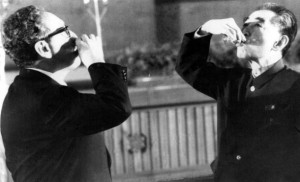Zhou EnLai: Perhaps it is the national character of the Americans to be taken in by those who seem kind and mild.
Kissinger: Yes.
Zhou: But the world is not so simple. . . .*
A brief review of On China by Dr. Henry Kissinger
Firstly, Dr. Kissinger delivers an intelligent and well-constructed review of recent Chinese history. This is an indispensable read for any China novice wishing to better understand modern China and the intent of recent US policy. Clearly the former Secretary of State understands the political and strategic issues better than anyone and he has coupled his extensive personal experiences with very solid research.
However, the author’s personal involvement in the evolution of the US-China relationship and to some extent his actual responsibility for the success of the modern Chinese Communist Party (CCP) has rendered this great statesman incapable of objectively evaluating the true nature of China’s ruling elite, seeing the devastation that China’s abusive trade strategy has wrought on American workers, considering the environmental disaster that China is inflicting on all of Asia, or being realistic about China’s regional and strategic military threats. It isn’t as though he doesn’t know the facts, and occasionally he cites them, he just can’t get any real world perspective on them because he simply hasn’t been in the real world for a very long time.
For Dr. Kissinger, history is an abstract game of strategy played across fancy diplomatic dinner tables, parlors filled with overstuffed chairs, and magnificent conference rooms. He has been to China dozens of times over a forty-year period, but I’d doubt he has ever really walked the streets of a Chinese city alone much less spoken anonymously to a normal Chinese citizen. He’s never felt the mud of rural China on his legs – unless perhaps he was helicoptered into somewhere for a photo op. From his ivory tower the prisoners in China’s labor camps, the women subjected to forced abortions, those beaten and tortured for their political or religious beliefs, or the unemployed workers standing outside America’s shuttered factories appear as mere pawns to be traded for the attainment of bigger strategic objectives in a captivating game of geopolitical intrigue.
Dr. Kissinger remains a tragic captive of meta-ethical relativism. He is simply unable to really see evil for what it is and would never dare to call it out in the way that braver men like Churchill or Reagan have. He can casually mention the millions who died during Mao’s Great Leap Forward or suffered in the insanity of his Cultural Revolution and yet still fawn on the Chairman as a congenial host. The chapter in which Kissinger glosses over the massacre at Tiananmen without counting the dead – or even acknowledging why doing so remains impossible – was particularly disturbing. He enumerates the body count in countless wars and uprisings before June 4, but finds this event worthy of a chapter only because he is compelled to – very weakly – justify the pathetic US policy reaction.
In his epilogue, Dr. Kissinger builds a careful, amoral analysis of China’s rise as a mirror of Germany in the years before the First World War. That period of classic diplomacy is a great analogy for a strategy hound not wishing to be burdened by pesky ethical issues. He has carefully selected it to accommodate his natural tendency to moral equivalency. For example in this section he asserts that in the possibly emerging US-China cold war that “both sides would emphasis their ideological differences” as though they were equally valid or that consideration of their validity is too trivial to investigate. What the good doctor fails to confront is the fact that the current Chinese ideology is simply National Socialism with Chinese characteristics. This fundamental truth suggests the much more disturbing analogy of the years before the Second World War as the more apt analogy for this analysis, complete with the goose-stepping troops on review and a showboat political Olympic games.
Nonetheless, I highly recommend the book if for no other reason than it nicely summarizes the dominant policy paradigm that is currently leading the world toward the brink of disaster. As Sun Tzu wisely teaches, it is very important to understand your enemy and America’s most dangerous enemy is China and our domestic China apologists.
The essence of all this is nicely summed up by a insightful comment from Deng Xiaopeng which Kissinger offers to us without a hint of irony:
“Your spokesmen have constantly justified and apologized for Soviet actions. Sometimes they say there are no signs to prove that there is the meddling of the Soviet Union and Cuba in the case of Zaire or Angola. It is no use for you to say so. To be candid with you, whenever you are about to conclude an agreement with the Soviet Union it is the product of concession on the U.S. side to please the Soviet Side.”
– Greg Autry teaches Macroeconomics at the Merage School of Business, UC Irvine and is co-author (with Peter Navarro) of the new book “Death by China” www.gregautry.us
* Kissinger, H. Years of Upheaval, 1982. pg. 698

